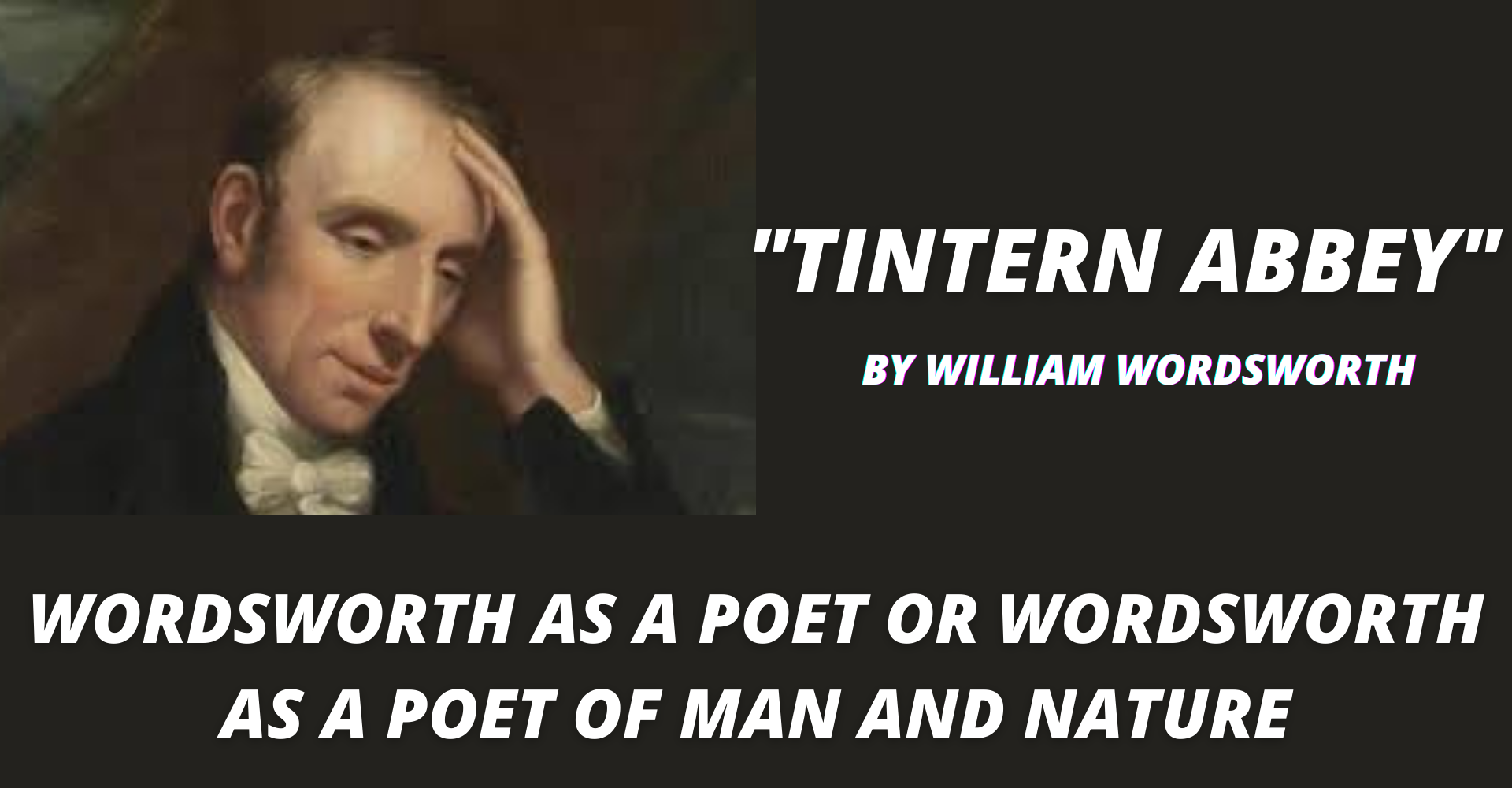When the stable aristocratic Society of the 18th century broke down and the common man became prominent, individualism replaced the old order. Wordsworth’s achievement was that he discovered the unity of the human soul and its vital link with nature. In ‘line written in early spring, we find him declaring:
“To her fair works did nature link
The human soul that through me ran;
And much it grieved my heart to think
What man has made of man”.
This vision of the unity of the soul is also found in a sublime passage in “Tintern Abbey”.
“…a sense sublime,
Of something far more deeply interfused,
Whose dwelling is the light of setting suns,
And the round ocean and the living air,
And the blue sky, and the mind of man;
A motion and a spirit, that impels
All thinking things, all objects of all thought,
And rolls through all things”.
Such a magic vision of a single spirit rolling through all things is a unifying vision of high significance and it shows the sense of sympathy and unity that Wordsworth had with of human and different objects of nature. What is more, the best poetry of Wordsworth shows us how to live. According to Matthew Arnold, this answer to the question (How to live) are moral ideas and Wordsworth is great because of the application of search moral ideals of life . In the to passage quotes above, we find Wordsworth reaction against industrialism and his positive vision of the human soul sharing joy with the objects of nature. Mark Van Doren calls him (the first great modern poet of England and Europe and by extension of America), he adds “This is not to say that his imparts is historical, for the lives and will continue to life”.
Wordsworth lives and will continue to leave because he shows how the sights and sounds of nature can be a source of permanent joy. In “Tintern Abbey” Wordsworth tells us how he enjoys nature with his senses in youth.
“The sounding cataract Haunted me like a passion: the tall rock, The mountain, and the deep and gloomy wood, Their colours and their forms, were then to me An appetite”.
This acquaintance with nature, based on Sensuousness perception, enriched by the light that comes from the soul – ‘the light that never was on the sea or land; In later year, ’the still sad music of humanity soul’. It is obvious that Wordsworth’s contemplative habit of mind is different from the rational and logical mind of a philosopher. We consider him to be essentially a poet whose poetry ‘takes its origin from emotion recollected in tranquility.
In ‘The Prelude” we find the growth of the poet’s soul presented in a series of pictures. As a child boated alone at night in the lake and, in his sense of guilts perceived a mountain coming towards him with an evil purpose. In Empson’s analysis, this fear of mountains is reduced to a token of father complex. Then there is a picture of boys skating in ice, which remark that the echoes of their joyful thoughts seemed to be sad. Thus, the poet’s childhood had joyful end frightening experiences. As a boy he went to school and became aware of the creative light.
“An auxiliary light Came from my mind which on the setting sun Bestowed new splendor, the melodious birds, The gentle breezes, fountains that ran on, Murmuring so sweetly in themselves, obeyed A like dominion; and the midnight storm Grew darker in the presence of my eye”.
It made bright things brighter and dark things darker. At Cambridge he read the great poets of England but he rambled more than he read. Later on, he tells us how his imagination was impained by the French Revolution and then restored by visions of the Druids sacrificing human beings to their goals.
Wordsworth is generally considered to be a poet of joy, but he is fully aware of the suffering of human beings. The great killing during the French Revolution, the human sacrifices made by the Druids, the still sad music of humanity are all present in his ultimate vision. As James Smith points out in his ultimate vision. As James Smith points out in ‘scrutiny’, ‘Michael’ shows that suffering and human life are inseparable. The tragedy of ‘Michael’ is a tragedy of luke base, he is forced to send luke away by a chance mishap and luke goes astray due to the evil influence of the city. The shepherd endures his suffering as all men should. There is no external manifestation of sorrow too, he even goes to the unfinished sheepfold but people believed that he never lifted up a ‘sing stone’. The poetry of Wordsworth is very simple and quality, in this poem as in most passages of “The Prelude” but there are occasions when his intake fast hue and it makes his poetry abundantly rich and magnificant as in the passage of ‘Tintern Abbey’ and in description of the auxilians light in “The Prelude”. On the whole these poems of Wordsworth have rare power, healing power of great poetry.
PLEASE HELP ME TO REACH 1000 SUBSCRIBER ON MY COOKING YT CHANNEL (CLICK HERE)











